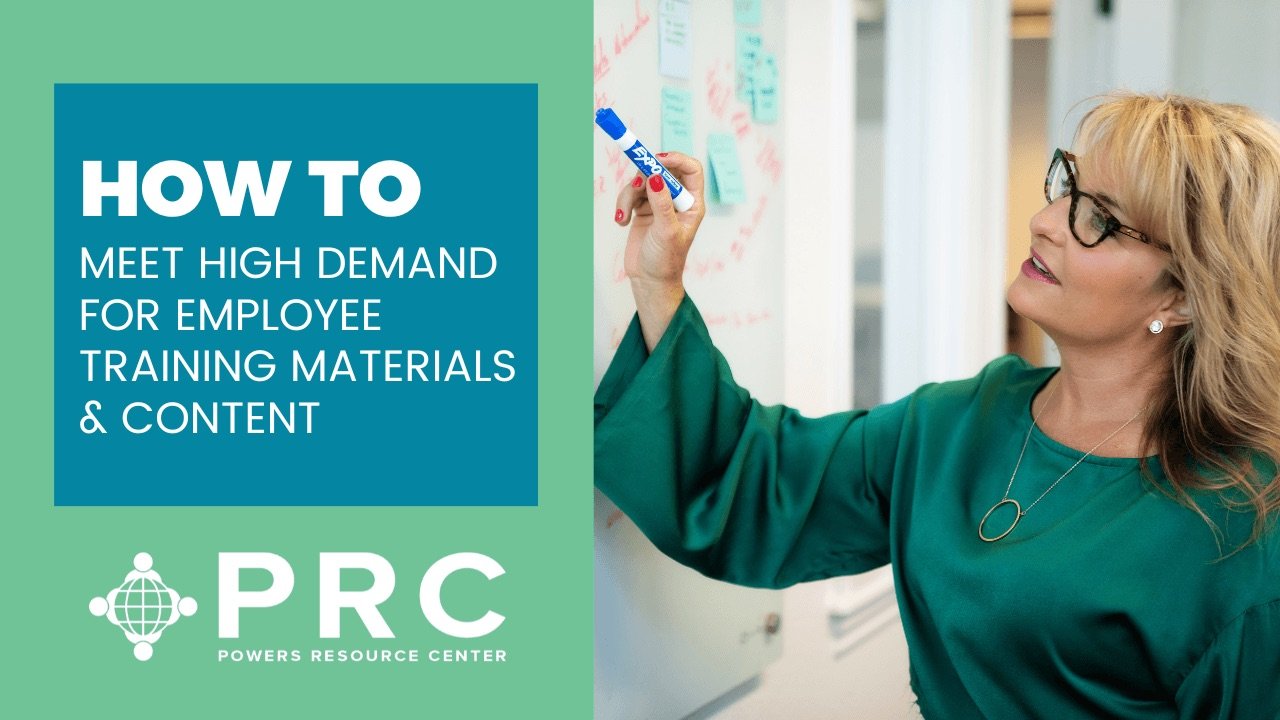Employee Training Materials & Content
In today's rapidly evolving business environment, organizations worldwide are navigating significant shifts in leadership and team dynamics.
According to LinkedIn's 2023 Workplace Learning Report, 93% of companies prioritize employee retention amid a competitive job market. The report highlights key factors driving job seekers, including opportunities for career advancement and skill development.
As businesses adapt to high-tech innovations, foster remote team cohesion, and bridge generational communication gaps, the demand for enhanced leadership capabilities continues to accelerate. That’s where employee training materials enter the picture.
Challenges in Developing Employee Training Materials
Time, Resources, and Costs
Corporate trainers often face significant challenges in allocating time and resources to research, write, design, and develop employee training materials for their teams. Research indicates that creating effective training content demands substantial investment in terms of time, energy, and financial resources.
According to industry insights, developing comprehensive training materials can consume up to 200 hours or more, depending on the complexity and scope of the content. This process involves conducting thorough research, crafting engaging content, designing visually appealing materials, and testing effectiveness through pilot programs or feedback loops.
The strain on trainers to balance these tasks alongside their primary responsibilities underscores the need for accessible, ready-to-use training solutions that streamline the training delivery process and maximize learning outcomes.
What Are Employee Training Materials?
Employee training materials for corporate trainers and facilitators are comprehensive resources designed to support the delivery of effective training programs within organizations. These materials include various components that help trainers conduct engaging and impactful learning sessions. Here are key elements typically found in employee training materials for corporate trainers and facilitators:
Facilitator Guides: Detailed manuals that outline session objectives, agenda, activities, and discussion points. Facilitator guides provide step-by-step instructions to ensure consistent delivery of training content.
Presentation Slides: Visual aids that accompany training sessions, featuring key concepts, graphics, and supporting information. Presentation slides enhance understanding and engagement among participants.
Workbooks: Interactive resources containing exercises, case studies, and reflection prompts. Workbooks allow participants to apply learning, reinforce concepts, and track their progress throughout the training.
Participant Handouts: Supplementary materials provided to participants, including summaries, checklists, and additional resources for further study or reference.
Pre/Post Training Assessments: Surveys or quizzes administered before and after training to assess participants' knowledge, skills, and confidence levels. These assessments help measure the effectiveness of the training program and track improvements.
Coaching Tip Sheets: Guidance for managers or supervisors to support employees' learning and application of new skills in the workplace. Coaching tip sheets offer strategies for ongoing development and reinforcement.
Evaluation Forms: Feedback forms for participants to provide insights on the training session's content, delivery, and relevance. Evaluation forms help trainers gather feedback for continuous improvement of training programs.
Marketing Materials: Summaries or promotional content outlining the benefits and objectives of the training program. Marketing materials help generate interest and support for training initiatives within the organization.
These training materials are tailored to meet specific learning objectives, organizational goals, and audience needs. They are designed to be flexible, allowing trainers to customize content based on participant feedback and organizational requirements. By leveraging these resources, corporate trainers and facilitators can deliver engaging, informative, and impactful training experiences that contribute to employee development and organizational success.
As you can see, developing these materials and all their parts and pieces is a heavy lift for even the most resourced corporate training team.
The Importance of Employee Training Materials
Despite the significant time and resources that go into developing training content, the importance of these employee training materials cannot be overstated in today's competitive business landscape. These materials serve as the cornerstone of effective training programs, offering structured content that enhances employee skills, boosts productivity, and aligns organizational goals with individual development.
For starters, structured training materials ensure consistency in how information is delivered across teams and departments. This consistency helps standardize practices and procedures, reducing errors and fostering a unified approach to tasks and responsibilities. Employees receive uniform training experiences, which promotes fairness and equity in skill development.
Secondly, effective training materials significantly enhance knowledge retention among employees. By presenting information in clear, engaging formats such as presentations, workbooks, and interactive modules, organizations facilitate better comprehension and memory retention. This ensures that employees not only understand concepts during training but also retain and can apply this knowledge effectively on the job.
Plus, training materials empower employees to bridge the gap between theoretical learning and practical application. By including real-world examples, case studies, and simulations, these materials encourage hands-on learning experiences. Employees can practice new skills in a controlled environment, gaining confidence and competence that translates into improved job performance and efficiency.
And, well-designed training materials contribute to a positive organizational culture focused on continuous learning and development. They demonstrate an organization's commitment to investing in its employees' growth, which boosts morale, engagement, and loyalty. Employees feel valued when provided with opportunities to enhance their skills and expand their knowledge base, leading to higher job satisfaction and lower turnover rates.
So, the effectiveness of employee training materials lies in their ability to aid in standardizing training practices, enhance knowledge retention, bridge the gap between theory and practice, and foster a culture of continuous learning. By leveraging these materials effectively, organizations can drive sustainable growth, innovation, and success in today's dynamic business environment.
The Most Popular Types of Training Materials
A variety of training materials are essential tools for effective learning and development within organizations. Each type serves a unique purpose in enhancing employee skills and ensuring training success.
Workshop Summaries: Concise overviews highlighting key learning objectives and outcomes.
Presentation Slides: Visual aids that enhance learning through engaging graphics and content.
Workbooks: Interactive resources that reinforce learning concepts and provide exercises for practical application.
Facilitator Guides: Comprehensive manuals that guide trainers through session delivery, ensuring consistency and effectiveness.
Pre/Post Surveys: Tools for measuring training impact and ROI by assessing skill development and confidence levels before and after training sessions.
Diverse training materials, from concise summaries to comprehensive guides and interactive resources, collectively empower trainers to deliver impactful learning experiences that drive organizational growth and development.
How to Create Employee Training Materials
Going it on your own or considering Powers Resource Center’s (PRC’s) done-for-you employee training materials and content? Creating effective training materials involves several key steps:
Define Learning Objectives: Clearly outline what employees need to learn and achieve through the training program.
Content Development: Gather relevant information and insights to create engaging and informative training content.
Design and Format: Use professional templates and branding guidelines to create visually appealing materials that enhance comprehension.
Include Interactive Elements: Incorporate quizzes, case studies, and activities to encourage active participation and reinforce learning.
Measure Effectiveness: Implement pre/post surveys and feedback mechanisms to evaluate training impact and make necessary adjustments.
With PRC's ready-to-go training materials, organizations can simplify the training process, empower trainers, and achieve lasting results in employee development. Read on to learn more…
The number one way organizations are working to improve retention is by building a people-centric workplace culture. This requires new skills and competencies for leaders around topics including business skills, communication, emotional intelligence, and team building, to name a few. With the demand for new skills growing, how can trainers keep up delivering cutting-edge content?
PRC recently launched its Done-For-You Leadership Workshops to fill the gap for turn-key solutions that focus on the ever-evolving business leadership training landscape. By offering employee training materials that are award-winning, ready-made, with one-and-done-priced workshop content, trainers are given the tools they need without hundreds of hours being spent by businesses to develop new programs. This saves significant costs for businesses and frees up trainers who don’t have the time, team, or bandwidth to reinvent the wheel. This content is 100% customizable, editable, and brandable for each individual company, and ready and available to be used immediately. PRC’s training content is currently being used by 250 of the world’s top trainers in 18 different countries.
PRC’s Done-for-You Leadership Workshops program targets key competencies identified as priorities in building a people-centric workforce. For example, the workshop topic “Leading with Emotional Intelligence” trains leaders to embody Interpersonal savvy, situational awareness, adaptability, and demonstrate self-awareness. Another topic, “Mastering Difficult Conversations,” trains leaders to demonstrate composure, emotional control and stability, and build conflict management skills. “Building Leadership Coaching Skills” gives leaders the tools to practice deep listening skills, coach their teams, learn to remain open-minded, while encouraging team success. Other training materials and topics include:
Best Practices for Leading Remote Teams – Drive engagement, collaborate, and direct work.
Being Resilient in the Midst of Change, Growth & Uncertainty – manages complexity, courage, ambiguity, situational adaptability, and growth orientation.
Hiring Great Talent – builds resourcefulness and organizational savvy, develops talent, and attracts top talent.
Setting & Aligning Goals with Strategy – Drives results, business insight, directs works, plans & aligns, initiative, helps others succeed
Defining Clear Expectations & Providing Effective Feedback – Directs work, collaboration, and nimble learning, drives engagement, and reflection.
Practicing Relationship Strategies That Build Trust – Builds trust, relationship building, and team management.
One workshop training facilitator recently shared, “thanks to the done-for-you packaged topics and content, our training was organized into a yearlong Leadership Development program. Honestly, I don’t know how long it would have taken my team to develop the material on their own! Maybe, 100 hours? So far they have used five of the topics so realistically, maybe a whopping 500 hours?”
Saving time and resources is good business. Using award-winning, proven-successful content is the smartest option, especially when the demand is at its highest for quality training. The Done-For-You Leadership Workshops program is the easy choice for your employee training materials and content needs.
All of the leadership training topics we outlined can be customized based on the specific needs and goals of your organization. At Powers Resource Center, our leadership training programs often combine a variety of these topics to provide a comprehensive and well-rounded development experience for corporate leaders.
Make your life easier and get immediate results with PRC’s award-winning, ready-made, one-and-done-priced workshop content. Start delivering on-demand leadership training topics TODAY!
PRC’s “Done-for-You,” “Ready-to-Go” transformational workshop content provides your corporate trainers with all the tools they need to change behavior and GET RESULTS!
Learn more about our most-requested leadership training topics and schedule a complimentary strategy session today!
In This Article
Welcome to the PowerHouse, where we are Creating a Culture of Connection! Based on over 20 years of experience as an organizational development consultants and what we see leaders, teams, and organizations struggle with the most – we’re sharing important “nuggets” that you can use right away to build better relationships and create more whole-hearted connections. Enjoy!
TARA POWERS | CEO
Tara Powers, M.S, is a 25-year talent development expert with a Masters in Organizational Leadership, a coaching certificate from ATD and a Certified Training Manager. She’s a Five Behaviors of a Cohesive Team Authorized Facilitator and Everything DiSC Solutions Provider. Her success in working with over 350 companies and thousands of leaders has taught her how to achieve the results company executives want and still make sure the attendees are having fun in the process.
We wrote THE books on the virtual workplace…order your copies TODAY!
Virtual Teams for Dummies and Working from Home for Dummies.







